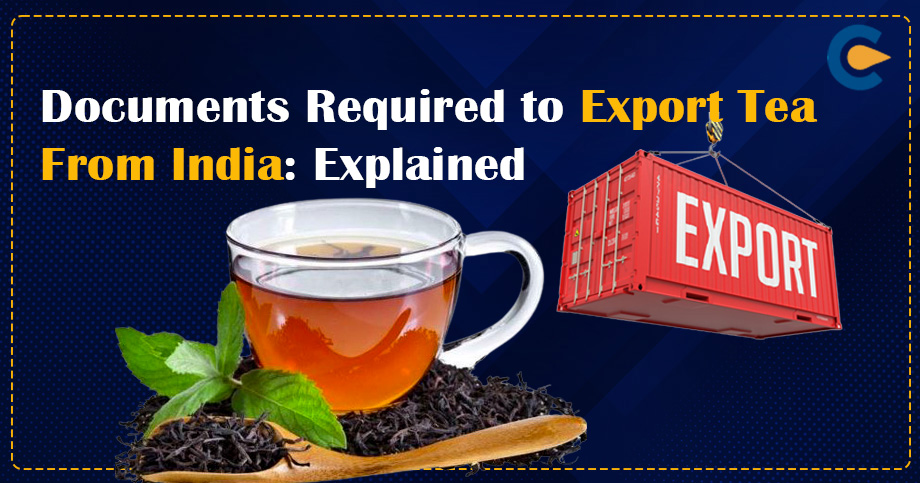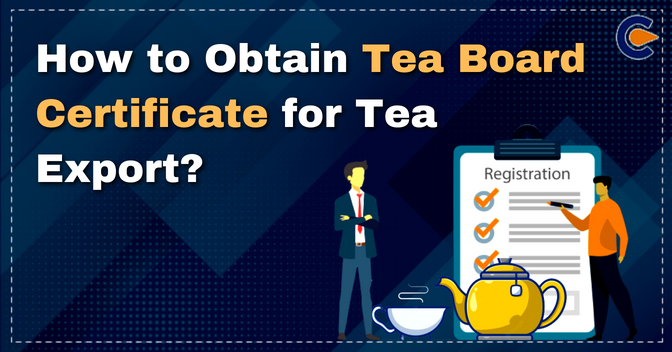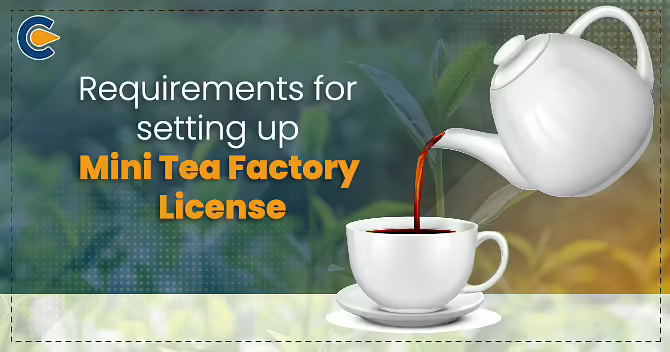India is one of the biggest cultivators and exporters of tea in the world. The global demand for Indian tea is increasing every passing day. The Indian tea industry is quite organized and employs millions of workers across the country. The Indian government is taking every possible measure to amplify the market presence of Indian-made tea. The apex body called the “Tea Board of India” takes care of this sector by regulating and overseeing the entire supply chain. In 2018, India exported approx $765 million worth of tea. The country experienced a 5 percent YoY growth from 2014 to 2018. Presently, India is poised at the second position in the global market regarding tea production and exportation. This write-up will look into the critical documents required to export tea from India in detail.
Why is Tea Board Membership Registration necessary?
A permit from the Tea Board of India is available to the registered exporters in India. The permit is granted through Registration cum-Membership Certificate (aka RCMC). The certificate protects exporters from uneven customs duties and duty drawbacks, which often translate into costly shipping charges. Despite being mandatory, RCMC provides ample cost-effective benefits to incentivize export business in India. RCMC also signifies that the products shipped to the importing country are of matchless quality and adhere to underlying standards. Thus, RCMC is treated as one of the vital documents required to export tea from India.
A person intending to commence the tea export business must secure these documents without a second thought. After obtaining these registrations, you can dig down the overseas markets to locate potential buyers. The importer would ask you to ship some samples before dispatching the consignment. This is the starting point of an exporting process. The sample shipment is a bit tricky since the exporter has to deal with the following paperwork:
- Invoice (in accordance with the format as required by the importing nation’s custom)
- Packing list
- Phytosanitary certificate accorded by the Plants and Quarantine Department
- Certificate of Origin accorded by the Chamber of Chamber
Note: In some countries like Costa Rica and the Czech Republic, you might have to pay customs duty in advance for shipping the sample.
The custom would cancel the shipment in case of any negligence in this regard. Documents are everything when it comes to cross-border shipment. Anyway, after sample approval, the importer agreed to the commercial terms as drafted by the exporter.
Significance of Packing List in Overseas Shipment
A packing list is an essential shipping document extensively used in international trade. It reflects vital information about consignments, such as product details enclosed in a container(s), size, and weight of the products. Freight forwarders usually require this document to pinpoint the weights and freight costs. Besides, custom authorities vet this document to determine the content of a particular carton or package.
Mandatory Documents Required to Export Tea from India
Following is the list of documents required to export tea from India.
- Company Registration (Proprietorship/Partnership/Private Ltd/Public Ltd);
- PAN Card (in the name of legal entity);
- GST Certificate;
- Import-Export Code granted by the Directorate General of Foreign Trade;
- Current Bank Account (preferably opened in a private or nationalized bank);
- An export permit from the Tea Board of India;
- Registration accorded by FSSAI[1] based on annual turnover and scope of operation;
Why is it mandatory to obtain an IEC code?
IEC or Import-Export code is one of the essential documents required to export tea from India. Being a fundamental legal permit, every exporter must apply for and then secure this permit before initiating overseas trade. Directorate General of Foreign Trade (aka DGFT) grants IEC registration against an online application and prescribed fees. Common documents to be uploaded during online filing include business certification, applicant identification proof, and types of product(s) to be exported.
Pre-shipment documents Required to Export Tea from India
Following are the pre-shipment documents required to export tea from India:
- Certificate of Analysis granted by the certified lab: Certificate of Analysis highlights the odour, chemical properties, microbiological properties, and shelf life of the tested sample.
- Quality certificate granted by SGS- an international inspection agency: SGS is the global leader in the vetting and testing of exportable goods. SGS has underpinned globally-recognized standards accepted by almost all custom authorities. The organization has a rampant presence with over 89,000 employees and over 2600 labs worldwide.
- Phytosanitary certificate accorded by the Plants and Quarantine Department: A phytosanitary certificate refers to a legal permit for shipping plants, plant-based products, or other regulated goods. Consignment enclosing this certificate ensures that the products therein fulfil the phytosanitary import norms of the importing nations. The Ministry of Agriculture and Farmer Welfare, operating under the aegis of GOI, confers this certificate. Common documents required to be attached with the application for this certification include:
- Legal permit accorded by the importing nation for exporting propagating plant material or seeds.
- The wildlife clearance certificate, if the exportable good falls under the CITES-Convention on International Trade in Endangered Species.
- Invoice copy and packing list
- Shipping or airway bill
- LOC, i.e. letter of credit
- Purchase order
- Trade Agreement
- Fumigation certificate
- Export license
- Export inspection charge and Fumigation fees
- COO or Certificate of Origin granted by the Chamber of Commerce: A Certificate of Origin refers to a legal document that identifies the nation of manufacturing of any commodity. It reflects various information, such as product details and export destinations. It affirms that the given consignment does not possess any forbidden commodities. COO is granted by the Indian Chamber of Commerce against the prescribed application and documents.
- RA Certification- Rainforest Alliance Certificate: When the container makes its way to the importing nation’s port, custom authority vets the same for non-compliance. Any negligence on the exporter’s part will compel the officials to revoke the shipment.
Note: The lab test report should be shared with the importer before shipping the consignment. It is vital to keep everything transparent and legalized.
Conclusion
Tea export from India is witnessing exponential growth with time. Exporters are now eyeing uncharted market territories to amplify their business presence. For the time being, tea export seems to be a profitable business venture that can pave the foundation for sustainable growth. The exporters need to pay extra attention to the documents required to export tea from India. Custom authorities of exporting and importing nations vet the shipment against the stringent provisions. The chance of being revoked is relatively higher for any shipment. Therefore, staying in line with the underlying shipping norms is essential to ensure hassle-free shipment.
Read our Article:How to Obtain Tea Board Certificate for Tea Export?











